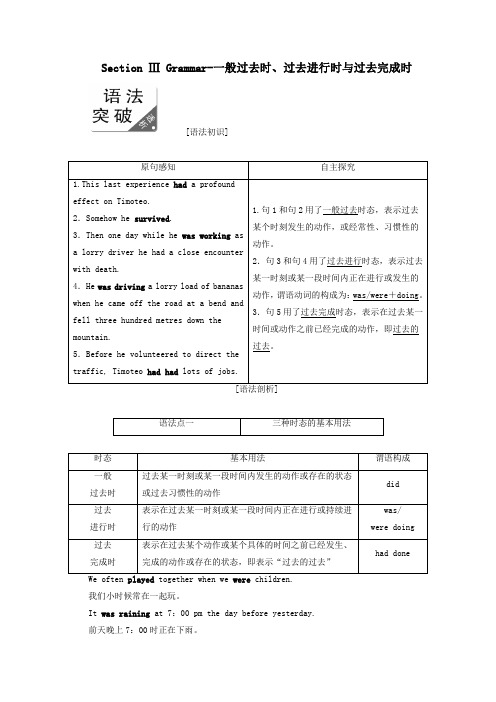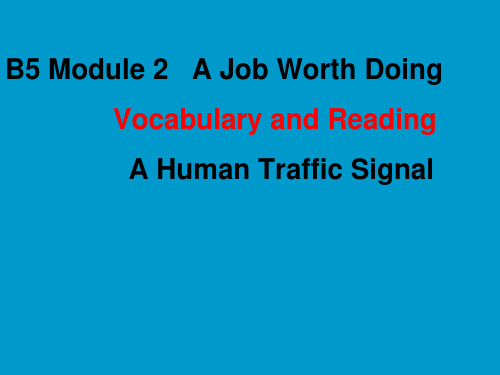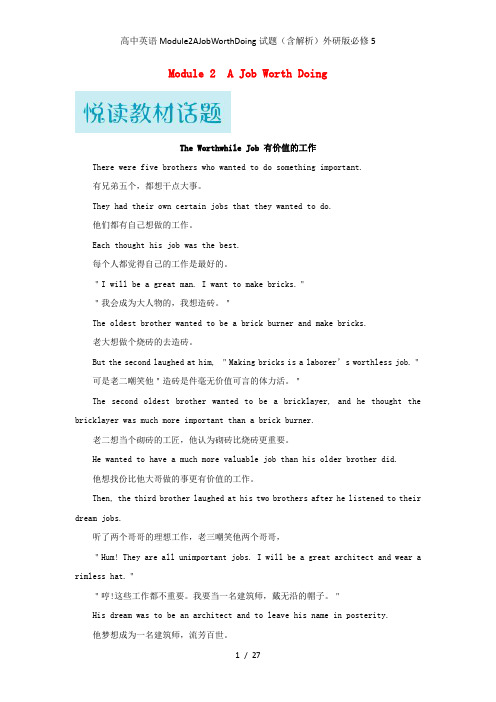外研版高中英语必修五Module 2A Job Worth DoingGrammar学案4
Module2AJobWorthDoing课件(外研版必修5)

models
Grace
孙娜
chairman
Prime Minister
athletes
astronaut
Cook / chef
electrician
miners
chemist
biochemist
Barber / hair-dresser
volunteer
business man
• Look at the photos to answer the questions.
1What the people are doing? • 2 What do the people do? • 3 Where are the people? • 4 How do you think of the job?
1.Remember the new words !!! 2. Comoplete activity one on page 12 !!!
• barber,(理发师 )hair-dresser , • doctor, surgeon, nurse, • pilot, navigator, astronaut, cosmonaut, taikonaut,sailor, • director, actor, actress,model,(模特) singer,
The jobs in the factory or office
• manager, secretary, • (秘书) assistant, salesman, baby-sitter, agent, worker,stuff, • analyst ,(分析师) miner • (矿工)….
The rest of jobs
businesswoman
外研版高中英语必修5Module2 AJobWorthDoing课本基础知识课件

5. I’m writing to you with the reference to the project that helps the children in poor areas, and I want to apply for it. 我给你写信的目的是我想申请关于帮助贫困地区孩子 的那个工程。
经过
7. _ta_k__e._._._f_o_r_g_r_a_n_t_e_d_ 以为……理所当然
8. _h_a_v_e_a_n__e_ff_e_c_t_o_n_ 对……产生影响
9. _in__r_e_sp_o_n__se__to_
作为……的回应
Ⅲ. 经典句式应用记 1. Life is hard at high altitude, and the mountains _m_a_k_e__c_o_m_m__u_n_i_c_a_ti_o_n_s_d_i_f_fi_c_u_l_t (使得通讯很难). (make+宾语+形容词作宾语补足语)
2. But often they just pass by, _ta_k_i_n_g__th_e__h_u_m__a_n_t_r_a_f_fi_c _s_ig_n_a_l_f_o_r_g_r_a_n_t_e_d_(把人体交通标志看成理所当然的事 情). (现在分词短语作状语)
3. _H_e__w_a_s__d_r_iv_i_n_g_a__lo_r_r_y__lo_a_d__o_f_b_a_n_a_n_a_s__w_h_e_n_(他正 开着一辆装满香蕉的卡车这时突然) he came off the road at a bend and fell three hundred metres down the mountain. (when作并列连词)
外研版必修五module2Ajobworthdoing单词讲解课件

A.supplied
B.provided
C.offered
D.afforded
4.qualified adj. 有资格的,合格的,胜任的
qualify
v. 使有资格,合格
qualification n. 资格
be qualified for sth.
be qualified to do sth. 有资格做/能胜任…..
The little boy is suffering from a bad flu. 这个小男孩又患上了严重的感冒。
1.一些市民要求与市长谈一谈。
Some citizens demand to have a talk with the mayor. 2.Protestors went on hunger strike to demand that all political prisoners(should)be freed. 抗议者绝食示威,要求释放所有政治犯。 3.His records are always in demand.
Andy has got a chance to become famous. (offer) 安迪在一部新电影中被给予了一个重要的角色,他有了 出名的机会
活学活用
It began to rain, so I C her my umbrella,
but to my surprise, she refused to take it.
5. respect vt. 遵守,尊重,尊敬 n.尊敬,尊重
respect sb. 尊敬某人
respect the law 遵守法律
show/have respect for sb. 尊敬某人
} in all respects
外研版必修五Module2AJobWorthDoingLanguagepoints教学课件

Thanks to the rapid development of economy, people’s living standard has improved. 2. 多亏了杰克不知疲惫的努力,音乐会获 得了巨大的成功。
Thanks to Jack’s tireless efforts, the concert was a huge success.
in particular thanks to in practice pass by
1. Many roads are in bad condition and accidents are frequent.
很多路况都不好,事故频频产生。
condition: the state that sth. is in 状态, 状况
4. In theory, the road can only be used by traffic going uphill from 8 in the morning … But in practice, few drivers respect the rules. 按理,这条路上从早晨8点开始只准许上山的 车通行……但实际上,几乎没有司机遵守这些 规则。
1. 别担心,他的状态非常好。
Don’t worry. He’s in perfect condition. 2. 我们可以在运动中保持良好的状态。
高中英语Module2AjobworthdoingSectionⅢGrammar_一般过去时过去进行时与过去完成时教案含解析外研版必修5

Section Ⅲ Grammar-一般过去时、过去进行时与过去完成时[语法初识]我们小时候常在一起玩。
It was raining at 7:00 pm the day before yesterday.前天晚上7:00时正在下雨。
When the teacher came into the classroom, Liu Hong had gone home.当老师走进教室时,刘红已经回家了。
集中演练11-1.单句语法填空①She had_learned (learn) some English before she came to the institute.②When I was a child, I often played (play) football in the street.③It was the third time that he had_left (leave) the key at home.④Joy said he would play football with me if I finished (finish) practicing the piano.⑤He had_worked (work) in the factory for five years before he moved here.⑥The hotel wasn't particularly good, but I had_stayed (stay) in many worse hotels.⑦An earthquake struck (strike) some parts of Italy last week, causing great damage to the local people.⑧ —Didn't the policeman notice the man breaking into the bank?—No, he was_looking (look) in the other direction.⑨Before he came to China, he had_learned (learn) Chinese for more than five years.⑩Sorry, I was_taking (take) a bath when you called me last night.1-2.单句改错⑪All the guests had appeared by ten o'clock, but the host wouldn't appear until 20 minutes later.wouldn't→didn't⑫I learned 2,000 English words by the end of last term.learned前加had⑬The thief tried to break away from the policeman who held him but failed.held→was_holding⑭John had liked to play the piano when he was in secondary school.去掉had ⑮ I had planned to meet Mr Thompson this morning but I had found there was nobody in the room when I came.去掉第二个had1.一般过去时的特殊用法(1)在时间、条件、让步、方式等状语从句中用一般过去时表示过去将来。
外研版必修5Module2AJobWorthDoingVocabularyandReading课件

B. More drivers start obeying the rules when seeing Timoteo working as a traffic signal.
C. The road going south from the capital is dangerous.
D. It runs north from the capital , La Paz.
3. Why has the death toll fallen according to part 2?
C. They have made some changes to the bend to make it less dangerous.
4. We can infer from the last passage that______.
A. Timoteo has formed the habit of changing jobs frequently.
Words and expressions
Explain the new words in English
profound a mission survive circular encouቤተ መጻሕፍቲ ባይዱter death toll
to still be alive, after being in an accident
accidents are frequent.
2. Which is True about the dangerous road ?
A.There is one vehicle from the road every 3 weeks .
外研版必修五Module2AJobWorthDoing语法教学课件

否定句的构成
主语 + be + not + 其他
is not = isn’t am not= ’m not are not= aren’t
*
• 1、Kitty isn’t (not) an English girl.
• 2、We aren’t(not) students.
• 3、I am not (not) from Taizhou.
I
do homework
watch TV
go to bed
play the piano
go for a walk
*
at…
Let’s talk: 2:Talk about your friends school dareakfast does morning exercises does sports does homework watches TV goes to bed plays the piano goes for a walk
5. It looks like a cat. (hat) It doesn’t look like a hat.
6. She has a dog at home. (a cat) She doesn’t have a cat at home.
*
11
Complete the sentences. Use the proper verb forms in brackets
1. Jordan __p_la_y_s__(play) basketball. He d__o_es_n_’_t_p_l_a_y_(not play) football.
2. I ___g_o___(go) swimming on XXXday. But I__d_o_n_’_t _g_o___ (not go) shopping.
高中英语Module2AJobWorthDoing试题(含解析)外研版必修5

Module 2 A Job Worth DoingThe Worthwhile Job 有价值的工作There were five brothers who wanted to do something important.有兄弟五个,都想干点大事。
They had their own certain jobs that they wanted to do.他们都有自己想做的工作。
Each thought his job was the best.每个人都觉得自己的工作是最好的。
"I will be a great man. I want to make bricks.""我会成为大人物的,我想造砖。
"The oldest brother wanted to be a brick burner and make bricks.老大想做个烧砖的去造砖。
But the second laughed at him, "Making bricks is a laborer’s worthless job."可是老二嘲笑他"造砖是件毫无价值可言的体力活。
"The second oldest brother wanted to be a bricklayer, and he thought the bricklayer was much more important than a brick burner.老二想当个砌砖的工匠,他认为砌砖比烧砖更重要。
He wanted to have a much more valuable job than his older brother did.他想找份比他大哥做的事更有价值的工作。
Then, the third brother laughed at his two brothers after he listened to their dream jobs.听了两个哥哥的理想工作,老三嘲笑他两个哥哥,"Hum! They are all unimportant jobs. I will be a great architect and wear a rimless hat.""哼!这些工作都不重要。
- 1、下载文档前请自行甄别文档内容的完整性,平台不提供额外的编辑、内容补充、找答案等附加服务。
- 2、"仅部分预览"的文档,不可在线预览部分如存在完整性等问题,可反馈申请退款(可完整预览的文档不适用该条件!)。
- 3、如文档侵犯您的权益,请联系客服反馈,我们会尽快为您处理(人工客服工作时间:9:00-18:30)。
Module 2《A Job Worth Doing》Period 2: Grammar—Review of verb forms Objectives●To review Past simple, past perfect and past continuous●To make a summary of tensesProcedures▇Reviewing Present simple, present continuous, present perfectSimple PastFORM Simple Past[VERB+ed]EXAMPLES:I visited my friends.I often visited my friends.NOTE: When you are using a verb tense with only one part such as Simple Past (visited), adverbs usually come before the verb (often visited). Please remember this is different from verbs with more than one part such as Present Continuous.USE 1Completed Action in the PastUse the Simple Past to express the idea that an action started and finished at a specific time in the past. Sometimes the speaker may not actually mention the specific time, but they do have one specific time in mind.EXAMPLES:I saw a movie yesterday.I didn't see a movie yesterday.Last year, I traveled to Japan.Last year, I didn't travel to Japan.She washed her car.She didn't wash her car.USE 2A Series of Completed ActionsWe use the Simple Past to list a series of completed actions in the past. These actions happen 1st, 2nd, 3rd, 4th...EXAMPLES:I finished work, walked to the beach, and found a nice place to swim.He arrived from the airport at 8:00, checked into the hotel at 9:00, and met the others at 10:00.USE 3Single DurationThe Simple Past can be used with a duration which starts and stops in the past. A duration is a long action often used with expressions like "for two years," "for five minutes," "all day" or "all year."EXAMPLES:I lived in Brazil for two years.Shauna studied Japanese for five years.They sat at the beach all day.We talked on the phone for thirty minutes.How long did you wait for them?We waited for one hour.USE 4Habit in the PastThe Simple Past can also be used to describe a habit which stopped in the past. It can have the same meaning as "used to". To make it clear that we are talking about a habit we often use expressions such as "always," "often," "usually," "never," "...when I was a child" or "...when I was younger" in the sentence.EXAMPLES:I studied French when I was a child.He played the violin.She worked at the movie theater after school.They never went to school, they always skipped.IMPORTANT "When clauses" happen firstClauses are groups of words which have meaning but are not complete sentences. Some clauses begin with the word when such as "When I dropped my pen..." or "When class began..." These clauses are called "when clauses" and they are very important. The examples below contain "when clauses."EXAMPLES:When I paid her one dollar, she answered my question.She answered my question, when I paid her one dollar."When clauses" are important because they always happen first when both clauses are in the Simple Past. Both of the examples above mean the same thing. First, I paid her one dollar, and then, she answered my question. However, the example below has a different meaning. First, she answered my question, and then, I paid her a dollar.EXAMPLE:I paid her a dollar, when she answered my question.ACTIVE / PASSIVE Simple PastEXAMPLES:Tom repaired the car. ACTIVEThe car was repaired by Tom. PASSIVEPast PerfectFORM Past Perfect[HAD] + [PAST PARTICIPLE]Examples:I had studied a little English when I came to the U.S.They had never met an American until they met John.NOTE: When you are using a verb tense with more than one part such as Past Perfect (had met), adverbs often come between the first part and the second part (had never met).USE 1 Completed Action Before Somethingin PastThe Past Perfect expresses the idea that something occurred before another action in the past. It can also show that something happened before a specific time in the past. EXAMPLES:I had never seen such a beautiful beach before I went to Kauai.Had you ever visited the U.S. before your trip in 1992?Yes, I had been to the U.S. once before in 1988.USE 2 Duration Before Something in thePast (Non-continuous Verbs)With Non-progressive Verbs and some non-progressive uses of Mixed Verbs, we use the Past Perfect to show that something started in the past and continued up until another action in the past.EXAMPLES:We had had that car for ten years before it broke down.By the time Alex finished his studies, he had been in London for over eight years.IMPORTANT Specific Times with the Past PerfectUnlike the Present Perfect, it is possible to use specific time words or phrases with the Past Perfect. Although this is possible, it is usually not necessary.EXAMPLE:She had visited her Japanese relatives once in 1993 before she moved in with them in 1996.If the Past Perfect action did occur at a specific time, the Simple Past can be used instead of the Past Perfect when before or after is used in the sentence. The words before and after actually tell you what happens first so the Past Perfect is optional. Both sentences below are correct.EXAMPLE:She had visited her Japanese relatives once in 1993 before she moved in with them in 1996.She visited her Japanese relatives once in 1993 before she moved in with them in 1996. HOWEVERIf the Past Perfect action did not happen at a specific time, Past Perfect MUST be used at all times. Compare the two sentences below.EXAMPLE:She had never seen a bear before she moved to Alaska. CorrectShe never saw a bear before she moved to Alaska. Not CorrectACTIVE / PASSIVE FORMS Past PerfectEXAMPLESGeorge had repaired many cars before he received his mechanics license. ACTIVE Many cars had been repaired by George before he received his mechanics license.PASSIVEPast ContinuousFORM Past Continuous[WAS / WERE] + [VERB+ing]EXAMPLES:I was studying when she called.I was carefully picking up the snake when it bit me.NOTE:When you are using a verb tense with more than one part such as Past Continuous (was picking), adverbs often come between the first part and the second part (was carefully picking).IMPORTANTClauses are groups of words which have meaning but are not complete sentences. Some clauses begin with the word when such as "...when she called " or "...when it bit me." Clauses with the Past Continuous usually start with while. While expresses the idea "during the time." Study the examples below. They have the same meaning. EXAMPLES:I was studying when she called.While I was studying, she called.USE 1Interrupted Action in the PastUse the Past Continuous to indicate that a longer action in the past was interrupted. The interruption is usually an action in the Simple Past. Remember this can be a realinterruption or just an interruption in time.EXAMPLES:I was watching TV when she called.When the phone rang, she was writing a letter.While we were having a picnic, it started to rain.Sally was working when Joe had the car accident.While John was sleeping last night, someone stole his car.USE 2 Specific Time as an InterruptionIn USE 1, described above, the Past Continuous is interrupted by an action in the Simple Past. However, you can also use a specific time as an interruption.EXAMPLES:Last night at 6 p.m., I was eating dinner.At midnight, we were still driving through the desert.IMPORTANTIn the Simple Past a specific time is used to show when an action began or finished. In the Past Continuous a specific time only interrupts the action.EXAMPLES:Last night at 6 p.m., I ate dinner.(I started eating at 6 p.m.)Last night at 6 p.m., I was eating dinner.(I started earlier and at 6 p.m. I was in the process of eating dinner.)USE 3Parallel ActionsWhen you use the Past Continuous with two actions in the same sentence, it expressesthe idea that both actions were happening at the same time. The actions are parallel. EXAMPLES:I was studying while he was making dinner.While Ellen was reading, Tim was watching television.They were eating dinner, discussing their plans and having a good time.USE 4AtmosphereIn English we often use a series of Parallel Actions to describe atmosphere in the past. EXAMPLE:When I walked into the office, several people were busily typing, some were talking on the phones, the boss was yelling directions, and customers were waiting to be helped. One customer was yelling at a secretary and waving his hands. Others were complaining to each other about the bad service.USE 5Repetition and Irritation with"Always"The Past Continuous with words such as always or constantly expresses the idea that something irritating or shocking often happened in the past. The concept is very similar to the expression used to but with negative emotion. Remember to put the words always or constantly between "be" and "verb+ing."EXAMPLES:She was always coming to class late.He was constantly talking. He annoyed everyone.I didn't like them because they were always complaining.IMPORTANT Non-Continuous Verbs/ Mixed VerbsIt is important to remember that Non-Continuous Verbs cannot be used in any"continuous" tenses. Also, certain "non-continuous" meanings for Mixed Verbs cannot be used in "continuous" tenses. To express the idea of Past Continuous with these verbs, you must use Simple Past.EXAMPLES:Jane was being at my house when you arrived. Not CorrectJane was at my house when you arrived. CorrectACTIVE / PASSIVE Past ContinuousEXAMPLES:The salesman was helping the customer when the thief came into the store. ACTIVE The customer was being helped by the salesman when the thief came into the store.PASSIVE■Making a summary of tenses。
